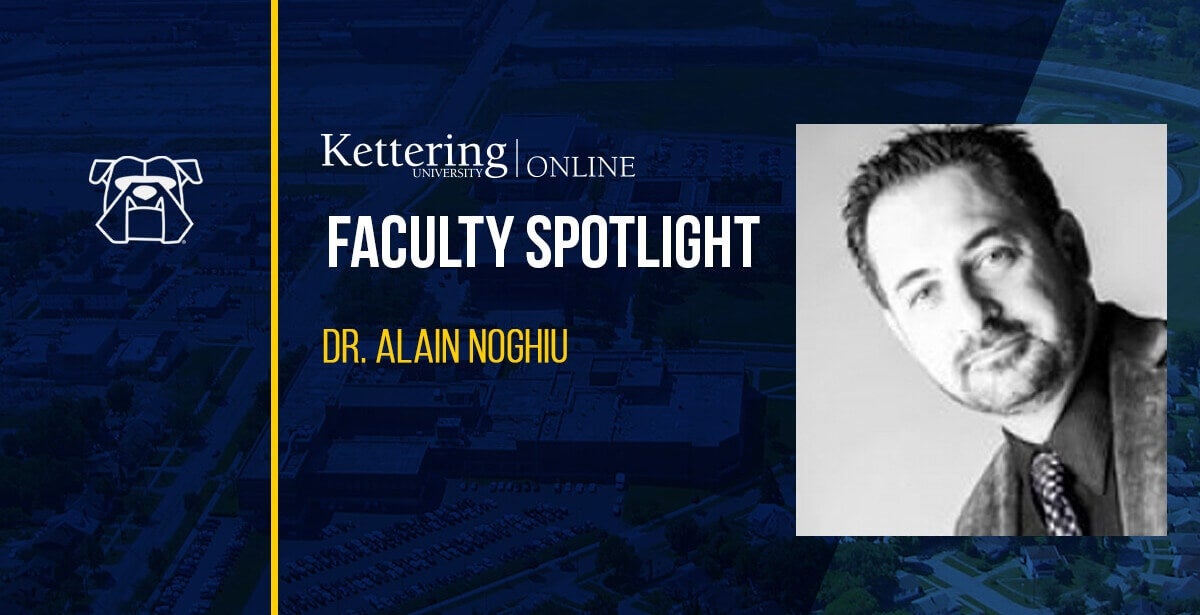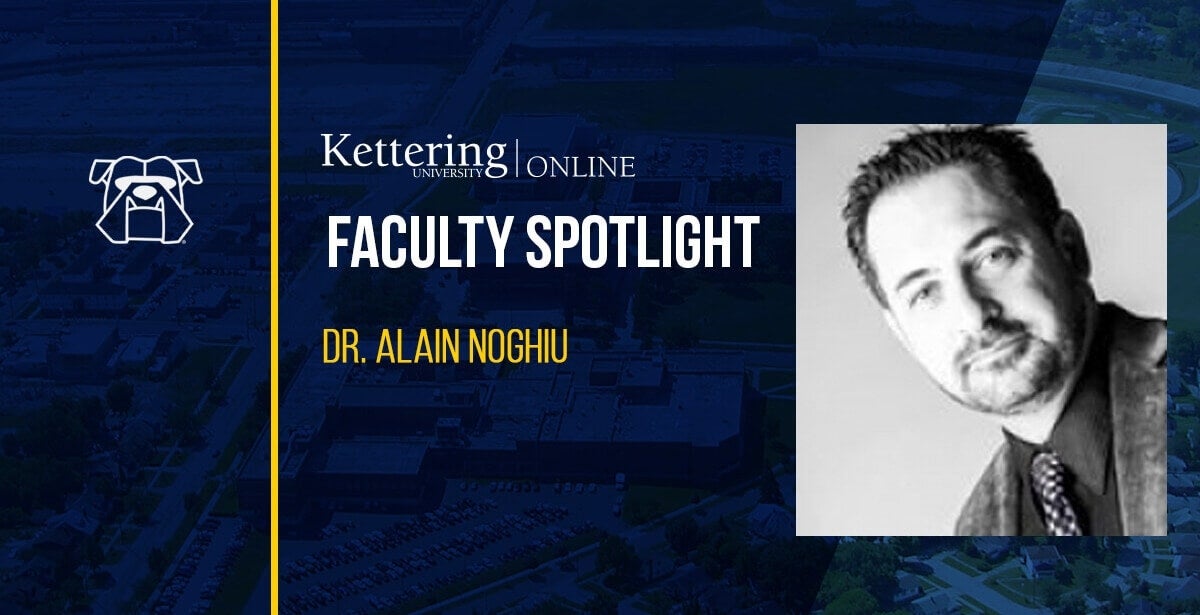
Faculty Spotlight: Dr. Alain Noghiu
By Jennifer Levy, MA
Program Development Manager/Senior Instructional Designer
Kettering Global
As Kettering University Online’s (KUO) Program Development Manager and Senior Instructional Designer, I have the distinct pleasure of working with our contributing faculty members, many of whom are subject matter experts for the courses they teach. Coming from a wide range of educational, career, and geographical backgrounds, KUO faculty unite in the effort to link transformative experiential education to rigorous academic standards with real-world applications for learning that lasts a lifetime.
This time, we shine the Faculty Spotlight on Dr. Alain Noghiu, who was born in Communist Romania and was nine years old when his parents escaped from that country and moved to the Netherlands. He received his M.A. in International Relations from the University of Amsterdam and a Ph.D. in Urban Affairs from the University of Delaware. Dr. Noghiu is also a founding partner of the Spiritual Capital and Moral Leadership Institute, which is a “growing network of professionals passionate about the nexus between organizations, leadership, ethics, spirituality, and morality… leveraging its knowledge creation to catalyze deep transformation in individuals, organizations, and society towards the advancement of the common good.” (SCMLI, 2019)
I was delighted to have an opportunity to interview Dr. Noghiu. The following are excerpts from our conversation:
Jennifer Levy: First, thank you for making the time to chat with me. You have been with KUO for some time teaching sections of International Business, Leadership, Managing People and Organizations, and Ethics and Leadership. In brief, what is your teaching philosophy?
Dr. Alain Noghiu: Knowledge, techniques, and skills are important, but personal integrity, values, and character reign supreme. I believe education should promote the holistic development of learners. Students learn best through the interactions they have with each other, and when they can relate to what they are learning. Intrinsic motivation is key and a level of discomfort is required to leave the “safe zone.” I see my role as facilitating these conditions.
Jennifer Levy: What were your first thoughts about teaching online?
Dr. Alain Noghiu: I have always felt positive about online teaching. It is a logical and fitting format for this day and age. Moreover, it enables interaction between individuals who would not otherwise interact. I enjoy the blend of being solitary yet connected that online teaching entails.
Jennifer Levy: What has surprised you most about teaching online?
Dr. Alain Noghiu: The depth of interaction that can be achieved. While some people see the virtual nature of online learning as a barrier, it can be very empowering since it allows people to formulate their thoughts without feeling the pressure of other people’s presence. Online learning empowers and gives voice to individuals who would otherwise remain in the background.
Jennifer Levy: What would you say your experience has been of teaching online as compared to teaching in the classroom?
Dr. Alain Noghiu: I like both, but it sure is convenient to not have to worry about your hair, about being five minutes late due to traffic, and about the never-functioning classroom projector.
Jennifer Levy: What advice would you give to someone who is taking his or her first online course?
Dr. Alain Noghiu: Establish a learning routine. Connect with your instructor and peers early on, manage your time, and when things get tough, reach out. Also, always give the benefit of the doubt.
Jennifer Levy: What would you say about your Kettering students?
Dr. Alain Noghiu: I am always surprised about the diversity of my students. I have had students from different places and backgrounds. Initially, I made some wrong assumptions about the gender distribution, to my surprise the classes are balanced in that sense. I learn a lot from my students, often about industries of which I knew little.
Jennifer Levy: A collection of soft-skills has become important to those who are hiring our students. What would you say are the top three soft-skills our students should work to cultivate?
Dr. Alain Noghiu: Cultural competence, global mindedness, and tolerance.
Jennifer Levy: I see your doctoral thesis was on Spiritual Capital Theory. I have never heard of that theory, can you elaborate?
Dr. Alain Noghiu: Spiritual Capital Theory is an emerging theoretical framework that tries to understand the value spirituality contributes to individuals’ lives and to society. Spiritual Capital is a religious dogma transcending concept, rooted in sociology and economics. It examines and theorizes the positive correlation between people’s spiritual and religious consciousness and individual behavior such as volunteering, crime, health indicators, economic choices, etc., as well as the collective value of spirituality like social cohesion, trust, etc. It sees spirituality as an additional form of capital expanding upon previously theorized forms of capital such as land, labor, human capital, and social capital, etc.
Jennifer Levy: Switching gears, in our courses, we talk a lot about leadership – particularly, the idea that many engineers and other technical workers get promoted to management because their technical work is so good but they have never been taught anything about managing others - what would you say to people in this position?
Dr. Alain Noghiu: Leadership is a skill that can be learned and practiced, like any other skill. Managing others is not as alien as it sounds, everybody manages others all the time! People manage others in families, when they order dinner, when they shop, etc. The “science” of leadership and management gives people some conceptual ideas about how to approach leadership and management formally. However, the most important part of leadership is character! A good individual character combined with a cognitive understanding of leadership theory, tools, and techniques, plus prior technical skills and experience is a very strong formula to succeed in “managing” others.
Jennifer Levy: What do you think are the top three leadership characteristics people should work to cultivate?
Dr. Alain Noghiu: Empathy, the art of consultation, and the pursuit of justice.
Jennifer Levy: What is the best advice a professor ever gave you?
Dr. Alain Noghiu: To adopt a humble posture of learning.
Jennifer Levy: What are a few career achievements or highlights you would like to share?
Dr. Alain Noghiu: I studied and conducted research in Amsterdam in the Netherlands, Moscow in Russia, Budapest in Hungary, and Delaware in the USA. I also worked at the World Administrative Head Quarters of the Bahá’í community in Haifa, Israel. I was a lecturer at a private university in Santa Cruz, Bolivia, and I founded the Spiritual Capital and Moral Leadership Institute (www.scmli.com).
Jennifer Levy: What fun things do you like to do in your spare time?
Dr. Alain Noghiu: Travel as much as I can to any destination, play tennis, and spend time with my family and three kids. I also engage in service activities with the local Bahá’í community in Madrid.
KUO honors and appreciates Dr. Noghiu for his contributions and highly regarded work with students and for taking time to chat!
At KUO, we are grounded by our past while innovating our future by designing, delivering, and supporting transformational educational experiences for a diverse global community.
KUO is proud to announce that they received a perfect score, 100/100, for credentialing and training online faculty from The U.S. News & World Report Best Colleges Rankings for 2018!
If you are interested in becoming a student, visit Kettering University Online for information about our online graduate degree programs.
ReferenceSpiritual Capital and Moral Leadership Institute. (2019). Meet the team. Retrieved from https://scmli.com/our-team/

